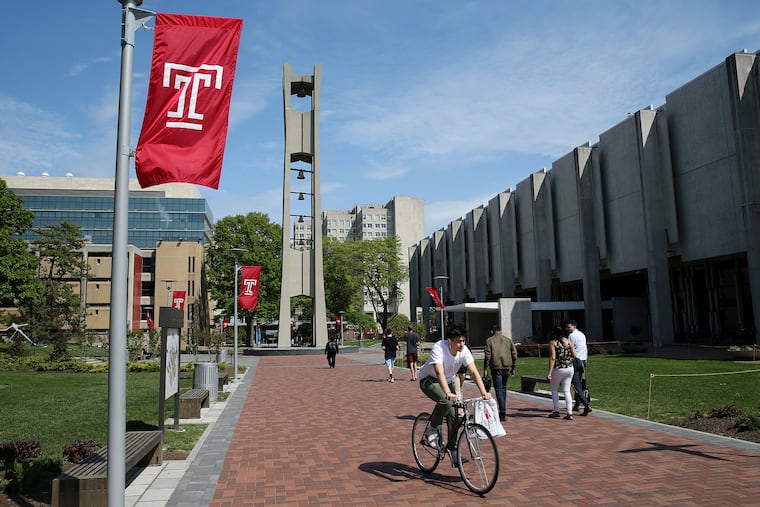Graduate students at Temple inch closer to a strike
A strike so late in the semester could be disruptive, though Temple says it has been preparing and will not let any labor unrest harm education.

The union representing about 750 graduate student teaching and research assistants at Temple University inched closer to a strike Friday.
Members of the Temple University Graduate Students’ Association voted to authorize their negotiating committee to call a strike if necessary, with a majority of members voting and 99% approving the measure. The move comes after more than 10 months of negotiating that graduate student leaders say has been unproductive.
“Our members have been showing up for this effort for months, and this vote shows how serious we all are about winning a fair contract,” said Bethany Kosmicki, 33, a graduate research assistant in the sociology department and a member of the negotiating team. “I really hope Temple’s administration does the right thing.”
A strike so late in the semester could be disruptive, though Temple says it has been preparing and will not let any labor unrest harm education. Graduate students teach core undergraduate courses and assist professors with research.
» READ MORE: Temple hospital workers sign contract, avert strike
“Our students and the completion of their courses with minimal to no disruption are our top priorities, and the university is taking steps to ensure that grades are secure and classes will continue through the end of the semester and beyond,” the school said on a website launched this week to address the negotiations and a potential strike.
Sharon Boyle, vice president of human resources, said professors, administrators with faculty experience, and high-level undergraduate students may be asked to step in to complete some duties, which include teaching, overseeing labs, and grading.
The union is seeking about a 50% wage increase in year one and 6% wage increases in each of the next three years, health care for dependents and family members, better parental and bereavement leave, and childcare subsidies, as well as changes in grievance procedures and other contract adjustments.
The university is offering graduate students, who earn an annual stipend of $19,000 to $20,000, a 2% wage increase the first year, 1.75% in the second and third years, and 1.5% in the final year of the proposed four-year pact.
“It has been very difficult,” said Manasa Gopakumar, 28, a doctoral candidate in philosophy from India and a member of the negotiating team. “Usually you would expect the employer to come back with many counterproposals, but Temple has been very adamant about making moves only on wages.”
Gopakumar said graduate students have a difficult time living off the current salary. The union is seeking what it is calling a cost-of-living adjustment in the base, raising it to about $32,807 in the first year, she said.
Boyle countered that the percentage increase request in year one is unreasonable.
“I’ve been at Temple about 25 years, and there’s never been a situation where we’ve even come close to that,” she said.
The two sides have a negotiation session set for Thursday, so a strike would not happen before that, she said. If a strike is called, it would be the first one in the graduate student union’s approximately 20-year history. The group’s previous contract expired in February.
The union’s website states in large letters: TUGSA ready to strike.
Temple in a statement said it is willing to continue to negotiate on wages, but that there are limitations.
The university noted that graduate students are part-time, temporary employees who work nine months out of the year and 20 hours a week on average, yet get benefits for the full year. Their stipend comes out to about $25 an hour, the university said. The students also receive free tuition, which is worth about $20,000 annually, the school said.
Those with full appointments do not pay for their health-care benefits, an arrangement that Boyle said no other Temple employees have, but they have to pay if they want health care for their families.
“The university hopes that a strike can be avoided. However, should TUGSA choose to strike, it is important to note that members who participate in that action will lose significant benefits, including their tuition remission, stipend, and health-care benefits and that outcome benefits no one,” the school said.
Boyle said Temple also is recommending that international students consult with an immigration lawyer for any potential impact on their visas before making a decision to strike.